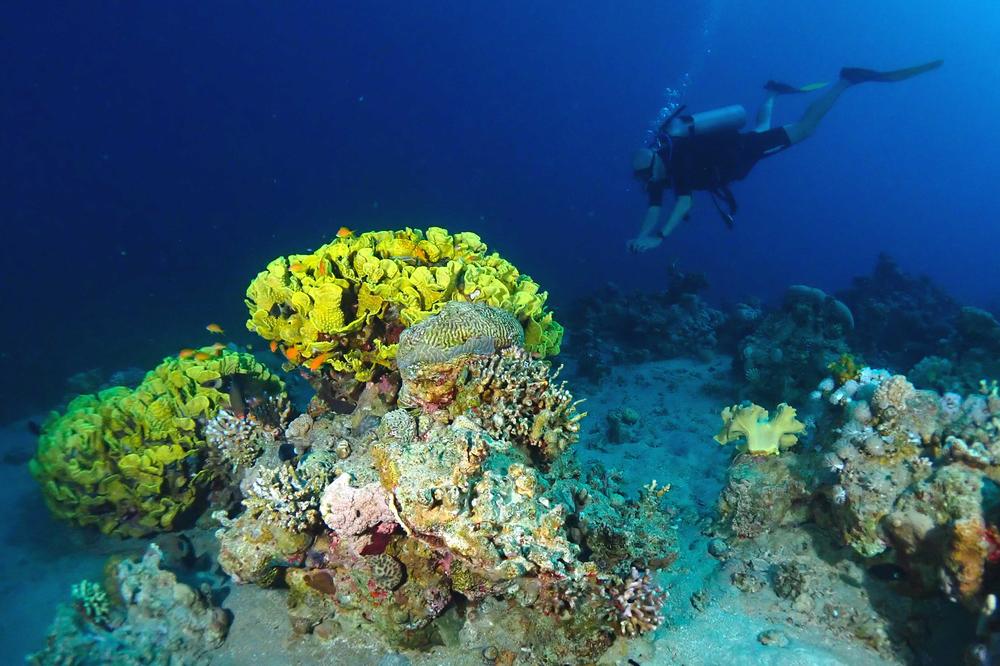Red Sea Reefs
Freie Universität biologist Salah Amasheh is investigating the protein compounds that protect corals
Mar 17, 2023
With oxygen tank, diving mask, and fins in tow, Professor Salah Amasheh is researching coral reefs in the Gulf of Aqaba.
Image Credit: personal collection
Equipped with an oxygen tank, diving mask, and fins, Professor Salah Amasheh approaches a stony coral in the Gulf of Aqaba, Jordan. “Diving is a passion of mine; I am very lucky to be able to combine it with my work,” says Amasheh, a biologist and professor at the Institute of Veterinary Physiology, Freie Universität Berlin. Even as a child, he was enthralled by the Red Sea, drawing coral reefs in art class at school.
He learned how to scuba dive in Aqaba. Now he is carrying out collaborative work with researchers from the University of Jordan there. Since the start of the 2022/2023 winter semester, they have been investigating the most diverse type of marine habitat on Earth: coral reefs. However, all around the world, climate change has put the cnidarians that form these coral reefs at risk, which in turn threatens the survival of more than 4,000 species of tropical fish and a whole range of other organisms.
How Do Stony Corals Withstand Heat Stress and Environmental Pollution?
“We want to investigate stony corals’ resistance to heat stress and environmental pollution on the molecular and functional level, and how this differs depending on region and coral type,” says Professor Amasheh. “By doing so, we hope to make a contribution toward conserving the many species found here.” The research on the molecular level is taking place far away from the Jordanian coast, namely on Freie Universität Berlin’s veterinary campus in Düppel. “In Berlin, we are able to work on cultivated corals, use a variety of established techniques, and research their proteins,” explains Amasheh. To this end, Professor Amasheh is in close contact with the aquarium at the Berlin zoo.
The scope of his research depends on securing grants through submitting research proposals. “We have made some headway here, and we already receive a great deal of support and encouragement, for example, from the Department of Veterinary Medicine and the Division of International Affairs at Freie Universität,” says Amasheh, who leads the “Epithelial Barrier Research” working group at the Department of Veterinary Medicine. “The surfaces of all bodies and organs, of both humans and animals, are covered by a layer of cells called epithelial tissue,” he explains. This layer of cells acts as a protective barrier, shielding organs such as the skin from the outside world. “This is the object of our research or, more specifically, we are researching the proteins that connect neighboring cells with one another.”
Preserving Coral Reefs around the World
Protein compounds can be damaged by environmental conditions, toxins, and other factors. Inflammatory bowel disease is one typical example of this. However, protein compounds can also be strengthened. “We believe that the same principles apply to the protective protein compounds found in stony corals. After all, many of these barrier proteins are also present in corals, and in a very similar form,” says Amasheh who, in addition to his research work, also acts as the department’s Officer for International Relationships and Partnerships. To date, he and his team have primarily focused on mammal intestines in their research. “We want to build upon our experiences – if these results are transferable, they could be the key to preserving coral reefs around the world.”
This article originally appeared in German in the Tagesspiegel newspaper supplement published by Freie Universität Berlin.

